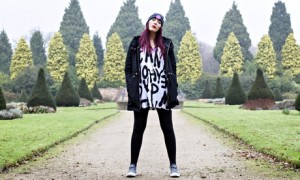Depictions of trans people in the media can have an enormous impact on the way society views them. On Road is working to change attitudes in media organisations.
Depictions in mainstream comedy of minority groups have an enormous impact on the way society views them. Little Britain’s famous “I’m a Laydee” sketch perpetuated the offensive stereotype of transgender people as nothing more than deluded “blokes in dresses.” Far from being a harmless joke, portrayals like these can be directly linked to the verbal and physical abuse often suffered by many of the UK’s estimated 600,000 transgender people.
However, earlier this month the BBC announced that they were commissioning the UK’s first ever transgender comedy sitcom, with a rare defining detail – the main character who is trans isn’t the usual derogatory stereotype but a fully fleshed out, authentic sounding trans woman. A person like anyone else, who happens to be trans. The part will be played by Rebecca Root. It’s a direct result of the work we’ve been doing to change the way the media represents one of the country’s most marginalised and least understood communities.
Research carried out in 2009 revealed that 78% of British trans people felt that the media portrayals they saw were either inaccurate or highly inaccurate. It’s clear attitudes need to change.
All About Trans, a project led by social enterprise On Road, is changing the way the British media represents and portrays transgender people, one journalist at a time. We’re a small team and our approach is simple but powerful. We change the way an influential media professional (one that can pull strings and make things happen) feels about trans people by encouraging personal connections. Most media professionals admit they have never knowingly had a conversation with someone who is gender variant so we remedy this through what we call “the interactions”.
Traditional diversity workshops for journalists often miss the mark by focusing on theoretical dos and don’ts, and we know from experience that the most senior and influential people rarely attend them. It’s first-hand experience of people and relationships that really leads to understanding. We organise two hour gatherings to suit the journalist, in the office, or out and about, creating the right environment to encourage open conversation, questions, and sharing of interests with a group of diverse trans people who will challenge perceptions and build an emotional connection.
The outcomes are many and varied. They’ve ranged from three critically acclaimed BBC Radio One documentaries presented by Paris Lees (who met commissioning editor Piers Bradford during one of our interactions at the BBC), documentary commissions from Channel 4, articles by trans people in local and national newspapers and dozens of radio interviews and television appearances from Question Time to Saturday Live – and the aforementioned first trans sitcom ‘Boy Meets Girl’, which has its roots in the BBC Writers Room Trans Comedy Award, a scheme born at a camp we ran at Channel 4 in 2011.
Collaborating with producers and executives, encouraging new content and complimenting them when they get it right – as opposed to pointing out all the ways they’ve got it wrong in the past – goes a long way.
The work has been so successful largely due to the extraordinary group of 200 passionate and diverse transgender volunteers who have helped us to engage with 160 media professionals so far across print, broadcast and online. The interactions we facilitate are led by local trans people of all ages and backgrounds and in just a year and a half, we’ve met with, amongst others, senior executives at The Observer, The Independent, The Sun, Daily Mail, Channel 4, BBC, CBBC, Press Complaints Commission, Press Association and journalists for regional newspapers such as the Scotland Herald and Dorset Echo.
Restorative justice plays a part too. In June, we met with the managing director of The Sun, Stig Abell, and his colleagues. They sat down with Dr Kate Stone (who we supported with a landmark negotiation with six national newspapers over transgender reporting after articles focused on her trans status after she suffered a near death experience with a stag) and Ayla Holdom, a Royal Air Force Flight Lieutenant who was outed by The Sun a few years ago. During this meeting, they explained how they’d been hurt and the editors apologised and removed the offensive headlines and news reports from their site.
On an interaction, it’s vital that participants feel comfortable to speak their minds and be open with each other. And people can make mistakes, for example with pronouns or terminology, but it’s important to explain the mistake, hear the apology, learn from it and move on.
Our approach, put simply, is not about pointing the finger and telling journalists what to say or not say. It’s about respecting the talent and position of the media professional and creating the right environment for them to be champions of the cause and to take it upon themselves to change the way their newspaper, programme or organisation deals with trans people.
Change can’t happen overnight, and behaviours and attitudes take time to shift, but human connections are sustainable, and as we work to maintain them, we’re starting to see big, exciting changes in the way the media works.



